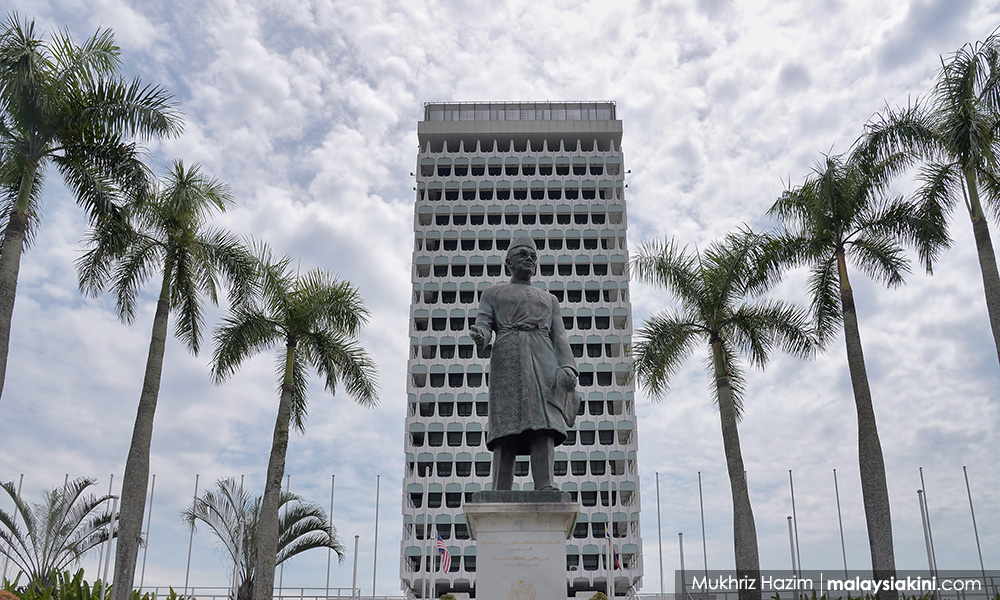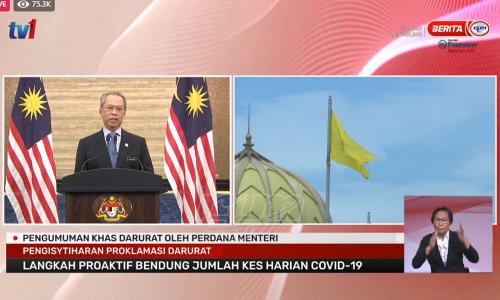MP SPEAKS | Unconvincing reasons for emergency
MP SPEAKS | Prime Minister Muhyiddin Yassin’s reasons for the emergency proclamation given in his Jan 12 speech are not convincing. They do not justify the Proclamation of Emergency under Article 150(1) of the Federal Constitution.
Nationalisation of private healthcare facilities
The prime minister contends that emergency ordinances are required to nationalise private hospital assets, a temporary takeover of land, buildings or property of private hospitals to treat Covid-19 patients. This is not an acceptable excuse. There are three reasons:
Firstly, the government already has the power under Section 26 of the Prevention and Control of Infectious Disease Act 1988 to requisition such premises as in the opinion of the director- general is necessary for carrying out the provisions of the Act. There is no necessity to enact emergency ordinances to carry out requisition of private healthcare facilities.
Secondly, the World Health Organization advises governments to take a whole-of-government and whole-of-society approach in their Covid-19 response working with the private sector.
Countries such as Spain, Italy, Germany, Ireland and the United Kingdom that have carried out some form of nationalisation of private healthcare facilities to treat Covid-19 patients have found that it does not necessarily produce the desired results.
The lesson learned from these countries is that the government should not alienate private providers who could be, should be and want to be partners in the Covid-19 battle. Fair cost payments, good faith and a willingness to work together will lead to best outcomes. Not nationalisation, expropriation or confiscation of private assets.
Thirdly, Section 26 of the Prevention and Control of Infectious Disease Act, in accordance with the requirements of the fundamental rights under Article 13(1) and (2) of the Federal Constitution, provides for adequate compensation to be paid for compulsory acquisition or use of the property.
The only reason that can be inferred that Section 26 is not used and an emergency ordinance is to be enacted, is to allow the government to take over the private healthcare facilities without adequate compensation. If this is the intention, then it is not nationalisation but expropriation and confiscation.
Foreign and local investors’ confidence will be so badly affected by the expropriation, the country will not be able to attract investments at a time when they are needed most. This will be a disaster for the economic recovery efforts arising from the impact of Covid-19.
No Parliament and state assembly sittings
There is no good reason for suspending Parliament and state assembly sittings for the duration of the emergency. Article 150(3) of the Federal Constitution provides that the Proclamation of Emergency is to be laid before both Houses of Parliament.

In the absence of any stipulated time, this means the proclamation must be laid before the Houses as soon as possible. The Houses are given the power to pass resolutions to annul the proclamation.
Shad Saleem Faruqi says in his book Document of Destiny that this underlies the constitutional scheme of parliamentary control over the executive even in times of Emergency.
Article 150(5) expressly provides for Parliament to make laws while an emergency proclamation is in force. Since 1964, the country had been under a constant state of emergency but Parliament has continued to meet.
The constitutional scheme is whether it is normal times or emergency times, Parliament must continue to perform its constitutional functions.
No election during the Covid-19 Pandemic
The reason for the emergency to avoid Parliament dissolution and the holding of elections during the Covid-19 pandemic is not an acceptable excuse. Muhyiddin no longer enjoys the support of the majority of the MPs after Gua Musang MP Tengku Razaleigh Hamzah, Machang MP Ahmad Jazlan Yaakub and Padang Rengas MP Nazri Aziz announced their withdrawal of support for him.
Under Article 43(4) of the Federal Constitution, Muhyiddin is required to tender his resignation as prime minister when he ceases to command the support of the majority of the MPs.
It is only when he does not tender his resignation that the Yang di-Pertuan Agong dissolves Parliament. Therefore, there is no necessity for Parliament to be dissolved and for an election to be held if he tenders his resignation.
Resignation the only option
Muhyiddin’s position as prime minister has always been inherently unstable and will always remain so. This is because, with only six out of the 13 original Bersatu MPs, he is dependent on other parties for his position.
It is costly and unsustainable. He has run out of positions and incentives to entice and maintain support.
Muhyiddin and the speaker, by refusing to table a motion of no-confidence, have failed to comply with the constitutional conventions and the spirit of Article 43(4) of the Federal Constitution.
Nevertheless, the Federal Court in the case of Mohammad Nizar Bin Jamaluddin v Zambry Bin Abdul Kadir [2010] 2 MLJ 285 at 307 said that loss of confidence in the prime minister is not confined to be established by a vote in Parliament, evidence of the loss of confidence can be gathered from other extraneous sources.
The announcements by the three MPs are clear evidence of Muhyiddin’s loss of support.
The Federal Court in Nizar’s case approved a passage in the judgment of the Privy Council in Adegbenro v Akintola [1963] 3 AER 544 PC that a prime minister ought not to remain in office once it has been established that he has ceased to command the support of the majority of the House.
For the sake of political stability, the health and economic well-being of the rakyat, Muhyiddin must comply with constitutional convention and Article 43(4). He must resign.
The emergency proclamation cannot prop up a prime minister who no longer commands the confidence of the majority of the MPs.
WILLIAM LEONG JEE KEEN is Selayang MP.
The views expressed here are those of the author/contributor and do not necessarily represent the views of Malaysiakini.
RM12.50 / month
- Unlimited access to award-winning journalism
- Comment and share your opinions on all our articles
- Gift interesting stories to your friends
- Tax deductable
